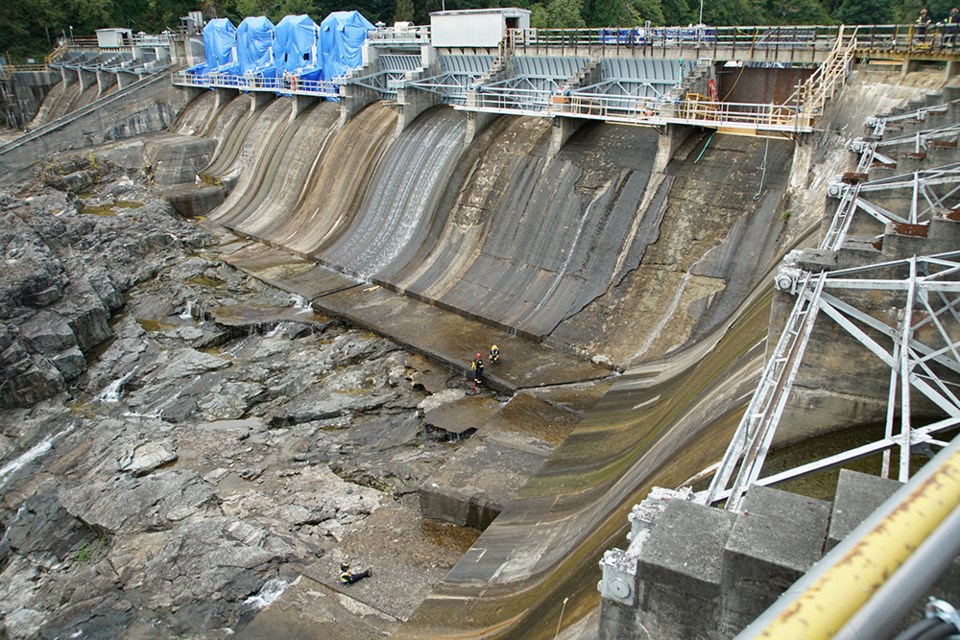City of Powell River councillors were provided insights into the Evolugen corporation, which owns and operates the Powell River and Lois River hydroelectric power facilities in the qathet region.
At the January 17 committee of the whole meeting, councillors heard a delegation from Rémi Moreau, vice-president, government and external relations for Evolugen. Moreau said the purpose of the presentation was to provide an overview of the business and provide an update on operations, as well as to provide clarity around the sale of the Catalyst Paper Tis’kwat mill site.
Regarding Powell River Energy Inc, which operates the two hydroelectric facilities, it provides safe, clean and reliable energy, according to Moreau.
“With our portfolio at Powell River Energy Inc (PREI), we have the two facilities, we employ 12 employees and we have about 75 megawatts of installed capacity,” said Moreau. “In 2021 we generated about 475 gigawatt hours of renewable energy.”
Moreau said the foundation or approach to doing business is a collaborative strategy to operate sustainably. The company wants a renewable power portfolio while also having a positive environmental, social and economic impact on the communities where the company’s employees live and work, he added.
“We will explore all options to maintain operations and be an economic driver in the community, working with City of Powell River, Tla’amin Nation, our partners and stakeholders for solutions,” said Moreau, adding that economic benefits were provided through taxes and water fees.
He said there are local jobs, involving employees and local contractors. In terms of community support, the company supports organizations such as Powell River and District United Way, Powell River Action Centre Food Bank and Powell River Salmon Society, he added.
Specific to the mill site, Evolugen is not going to pursue a purchase, but is open to working with potential partners who will be buying the site, according to Moreau.
Mike Peters, Evolugen director, public affairs, said he wanted to comment on the export permit filed with the Canada Energy Regulator (CER) to sell power to the United States.
“Going back to late 2021 when the closure of the mill was announced, there was a fair bit of uncertainty in terms of how we were going to have to structure our operations to keep them active,” said Peters. “Historically, we have been providing power to the mill and that load was no longer required on site, so at that time we filed for an export application with the CER that would allow us to export our power to the US. We needed to do that because there are no arrangements that allow us to sell our power locally, since the mill had closed.”
Peters said the CER application was filed out of an abundance of caution.
“When 2022 played out and we understood a little more about what was happening or not happening at the mill site, and how our own operations were adjusting, we decided that export application was no longer necessary,” said Peters. “Late last year, we withdrew the export application. It is no longer in front of the CER.”
Councillor questions
City councillor Trina Isakson asked about the level of community donations made, the taxes paid to the city and the amount of water fees being charged.
Moreau said in terms of taxes, Evolugen pays its municipal taxes through Paper Excellence, owner of the mill. He believed taxes paid through Paper Excellence were around $900,000 per year.
In terms of local donations, he said the company allocates about $35,000 per year. Evolugen pays the province around $800,000 per year for water rights, he added.
Isakson said long before the time of the Evolugen employees, the dam at Powell River was built and destroyed a salmon run. She asked if there are plans to build a salmon ladder or do anything to help restore the run.
Moreau said it has been discussed with Tla’amin and is something the company is willing to explore.
City councillor Rob Southcott said there is a lot of interest in the community in the Columbia Basin Trust, which supplies money to neighbouring communities in the Columbia River basin. He asked if the Evolugen has considered something like that for the qathet region.
Moreau said regarding the trust, PREI is an independent power producer and in the Columbia basin, it is a provincial crown entity, with public interest mandates.
“As a private company we have a different business model than a provincial crown corporation,” said Moreau. “PREI does not receive funding from the province to support its operations. We support the local community through property taxes or water fee licences.”
Peters said the trust is an interesting concept but Evolugen sees it as an “apples to oranges” comparison, given that the Columbia basin is public infrastructure, versus Evolugen’s private infrastructure.
Councillor Jim Palm asked what is being done with power currently being produced. Moreau replied that the company is selling to the United States because if it did not, the sites would not be working.
“We can’t sell to the mill, and we can’t sell to BC Hydro, either, due to regulatory constraints,” said Moreau.
During a public question period regarding Evolugen, resident Guy Gentner, a member of the public gallery, said last year, $88 million was put back into the communities in the Columbia basin. With the end of the Powell River mill site, the benefits to the community are gone, he added.
Gentner asked how PREI is able to export power and make money.
Peters said the export is managed through sales to an affiliate company, which then sells to the United States.
Shirley Gentner, also a member of the gallery, said she wanted to see a mayor’s task force to look at the power generation issue, as well as section 21 of the Powell River Incorporation Act, to see how that could be affecting the entire process.



